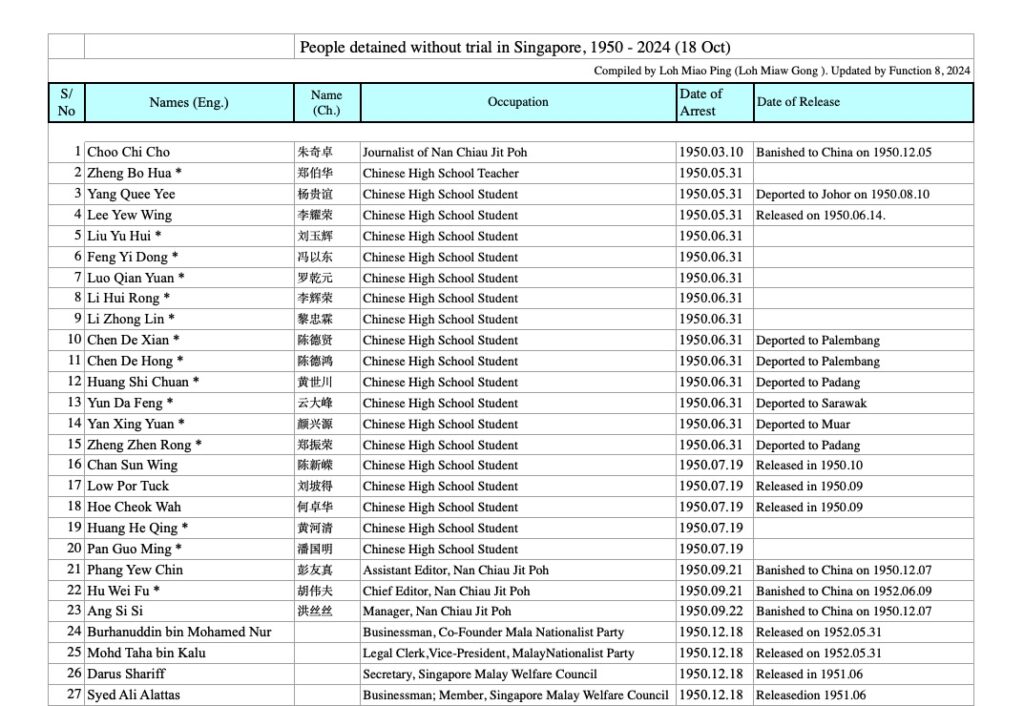- Updated 17 Aug 2024: adding two persons to the list.
- Updated 21 Oct 2024: adding 17 years old arrested in Aug.
- Updated 15 Feb 2025: adding six persons to the list (two of whom we have written about here).
- Updated 25 Mar 2025: adding two teenagers.
- Updated 25 Sep 2025: adding two persons (one is a 14 year old).
- Updated 5 Oct 2025: adding Chong Ming Kee 钟纪光. Arrested Aug 1966 and released Aug 1980. (No. 699 on the list)
The People’s Action Party (PAP) came into power in 1959 and is still in power today. The Internal Security Act (ISA) which allows the government to arrest and imprison people without trial is frequently used against members of the opposition parties as well as nipping dissent in the bud. The predecessors to this law are the Emergency Regulations Ordinance, 1948 and the Preservation of Public Security Ordinance, 1955. Thousands have been imprisoned without trial but no one except the Internal Security Department knows the exact number of prisoners.
In 2014, a list of 1190 names of detainees was compiled and published by Loh Miao Gong (Loh Miao Ping) in the book The Operation Coldstore in Singapore, Commemorating 50 Years edited by Poh Soo Kai, Tan Kok Fang and Hong Lysa. We have updated this list which now contains 1428 names. Please see list of detainees in PDF format

From 2001, the ISA was mainly used against Muslims. This was just prior to and soon after the destruction of the Twin Towers, New York. Suspicion fell on Al-Qaeda as the attackers. 2,996 (including the 19 hijackers of the planes) lost their lives. Three of them are likely to be still in prison today.
From 2015, the ISA was used against migrant workers from Bangladesh. Many were detained for about 30 days (the period allowed under the law for investigation) and deported to their homeland. From 2016, several of those detained were charged and convicted under the Terrorism (Suppression of Financing) Act (TSFA), 2002 for remitting small sums of money to organisations, alleged to be terrorist groups, in their home country. They were repatriated after prison sentences were completed.
From 2019, female Indonesian domestic workers were arrested under the ISA for remitting small sums of money to alleged terrorist organisations in Indonesia. Several were subsequently charged under the TSOFA and deported after serving prison sentences.
From 2015, many detainees were gazetted as terrorists under Schedule A of TSOFA prior to their release.
In 1995, Singapore acceded to the Treaty on the Rights of the Child. With effect from 1 July 2020, a “child” is defined as a person below the age of 18. Despite acceptance of the Treaty, young people below the age of 18 are not spared under the ISA. Between 2020 and February 2025, nine youths ranging from below the age of 18 to as young as 14 were arrested and detained under the ISA. Two 18 year olds who were arrested in December 2022 and November 2024 are still in detention today.
In recent times, the Singapore government claims that youths have been influenced by far right ideologies. In 2020, a 16 year old Indian boy of the Protestant faith was alleged to have plans to attack Muslims at a mosque. In 2024 an 18 year old who possessed t-shirts with neo-Nazi and white supremacist symbols as well as a tottoo of an incomplete sonnenrad, a symbol used by Brenton Tarrant who attacked Muslims in two mosques in Christchurch in 2019 was arrested His friend or acquaintance, a 17 year old was detained in 2025. Both are still in prison without trial.
Notes (updated on 15 May 2024)
- The number of detainees in the list is not conclusive. Only the ISD can provide the actual number.
- The Singapore government does not consider those who were arrested and detained for less than 30 days as detainees. Detainees were occasionally released within 30 days and re-detained. Some detainees have been detained in this manner for 60 and 90 days. No detention orders were issued. Some of the names in the list do not set out the release dates. They may be released but we do not have information.
- In 2011 Deputy Prime Minister Teo Chee Hean revealed in parliament that from 1959 to 1990, a total of 2,460 arrests were made under the ISA. Of those arrests, 1,045 were detained under the Preservation of Public Security Ordinance and the ISA. Thus the present list of 1,425 does not represent the actual number of victims of the ISA.
- There are about 17 detainees as of 15 May 2025.
The government should issue a full list of detainees.
